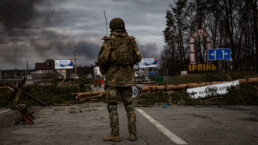The negative consequences of the conflict are global and unsustainable; if anyone benefits from prolonged fighting, it’s Russia.
by Suzanne Loftus, Responsible Statecraft
It lies in our interest — and that of the Ukrainians — to avoid a prolonged war in Ukraine. There is an important line between the West helping Ukraine defend itself, escalating the war to a dangerous level, and merely advancing a war of attrition — the latter of which may end up playing into Russian hands.
Given the catastrophically high cost of Russia’s invasion in human, economic, and political terms, and given that even those who advocate continuing to arm Ukraine say the outcome of the war is unclear, or even unwinnable, the United States should pair its military assistance with concrete steps towards laying the foundations for a peaceful end to the war. The timing may be ripe thanks to the fact that Western aid and Ukrainian successes on the battlefield have placed Ukraine in a favorable position for negotiations.

While some analysts understand the urgency to bring the war to an end, including Condoleezza Rice and Robert Gates, both former national security cabinet officials in the George W. Bush administration, they advocate for doing so by arming Ukraine with longer-range missiles and other offensive weapons in the belief it can prevail against Russia. Others, slightly more conscious of the escalatory risks of a “total defeat” strategy, including Ivo Daalder of the Chicago Council on Global Affairs and James Goldgeier of the Brookings Institution, do not seem to view a protracted conflict as something to avoid at all costs. They argue instead, that a prolonged war is the most likely scenario and that the West should do its best to support Ukraine through this. Neither approach would lead to a positive outcome.
Recent Posts
‘Unconstitutional. Unethical. Authoritarian.’ ICE Bars Millions Of Immigrants From Bond Hearings
July 18, 2025
Take Action Now One watchdog said the new policy “seems like a blatant attempt to stop them from exercising their right to due process.”……
Americans Are Not Nearly Alarmed Enough About Climate Change
July 18, 2025
Take Action Now Americans still don’t comprehend how imminent, dangerous, and far-reaching the threat is—and journalists are partly to blame.By…
The IRS Is Building A Vast System To Share Millions Of Taxpayers’ Data With ICE
July 17, 2025
Take Action Now ProPublica has obtained the blueprint for the Trump administration’s unprecedented plan to turn over IRS records to Homeland Security…
Israel’s Sudden Assault On Syria Is Unchecked Aggression
July 17, 2025
Take Action Now Jerusalem is bombing Damascus and threatening al-Sharaa’s rule, while Washington was hoping to help the nascent government on…




